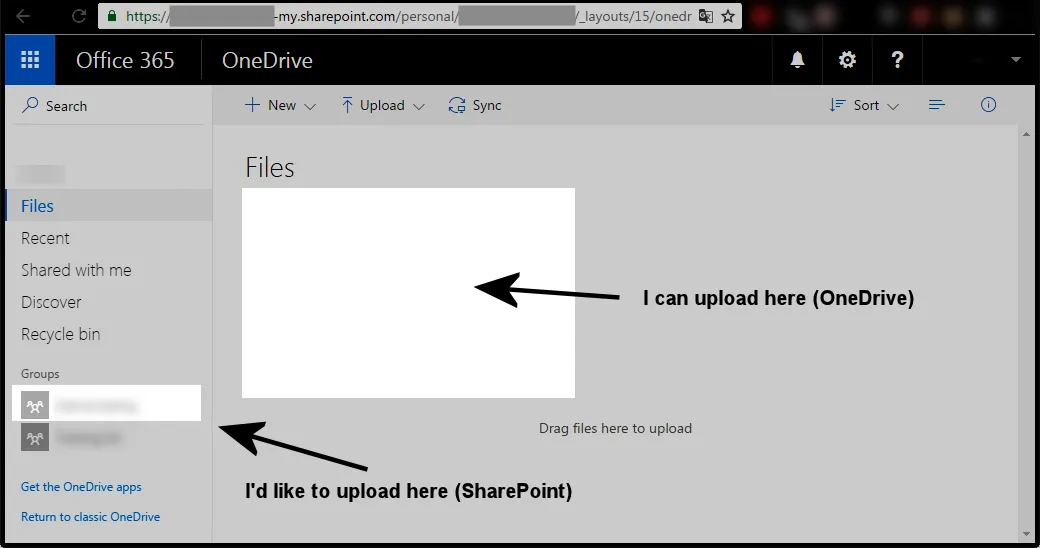使用Python OneDrive SDK,能否将文件上传到Microsoft SharePoint网站的Shared Documents库中?
此文档(在第一句话中)表示应该可以,但我无法使其工作。
我能够进行身份验证(使用Azure AD)并上传到OneDrive文件夹,但尝试上传到SharePoint文件夹时,我不断收到以下错误:
"Exception of type 'Microsoft.IdentityModel.Tokens.AudienceUriValidationFailedException' was thrown."
这是返回带有错误的对象的代码:
(...authentication...)
client = onedrivesdk.OneDriveClient('https://{tenant}.sharepoint.com/{site}/_api/v2.0/', auth, http)
client.item(path='/drive/special/documents').children['test.xlsx'].upload('test.xlsx')
https://{tenant}-my.sharepoint.com/_api/v2.0/(注意在{tenant}后面加上"-my"):client = onedrivesdk.OneDriveClient('https://{tenant}-my.sharepoint.com/_api/v2.0/', auth, http)
returned_item = client.item(drive='me', id='root').children['test.xlsx'].upload('test.xlsx')
我该如何将同一文件上传到 SharePoint 网站?
(在 Stack Overflow 上类似问题的回答(1,2,3,4) 要么太过模糊,要么建议使用不同的 API。我的问题是是否可以使用 OneDrive Python SDK 完成,如果可以,应该如何操作。)
更新:这是我的完整代码和输出。(敏感原始数据已替换为类似格式的无意义字符。)
import re
import onedrivesdk
from onedrivesdk.helpers.resource_discovery import ResourceDiscoveryRequest
# our domain (not the original)
redirect_uri = 'https://example.ourdomain.net/'
# our client id (not the original)
client_id = "a1234567-1ab2-1234-a123-ab1234abc123"
# our client secret (not the original)
client_secret = 'ABCaDEFGbHcd0e1I2fghJijkL3mn4M5NO67P8Qopq+r='
resource = 'https://api.office.com/discovery/'
auth_server_url = 'https://login.microsoftonline.com/common/oauth2/authorize'
auth_token_url = 'https://login.microsoftonline.com/common/oauth2/token'
http = onedrivesdk.HttpProvider()
auth = onedrivesdk.AuthProvider(http_provider=http, client_id=client_id,
auth_server_url=auth_server_url,
auth_token_url=auth_token_url)
should_authenticate_via_browser = False
try:
# Look for a saved session. If not found, we'll have to
# authenticate by opening the browser.
auth.load_session()
auth.refresh_token()
except FileNotFoundError as e:
should_authenticate_via_browser = True
pass
if should_authenticate_via_browser:
auth_url = auth.get_auth_url(redirect_uri)
code = ''
while not re.match(r'[a-zA-Z0-9_-]+', code):
# Ask for the code
print('Paste this URL into your browser, approve the app\'s access.')
print('Copy the resulting URL and paste it below.')
print(auth_url)
code = input('Paste code here: ')
# Parse code from URL if necessary
if re.match(r'.*?code=([a-zA-Z0-9_-]+).*', code):
code = re.sub(r'.*?code=([a-zA-Z0-9_-]*).*', r'\1', code)
auth.authenticate(code, redirect_uri, client_secret, resource=resource)
# If you have access to more than one service, you'll need to decide
# which ServiceInfo to use instead of just using the first one, as below.
service_info = ResourceDiscoveryRequest().get_service_info(auth.access_token)[0]
auth.redeem_refresh_token(service_info.service_resource_id)
auth.save_session() # Save session into a local file.
# Doesn't work
client = onedrivesdk.OneDriveClient(
'https://{tenant}.sharepoint.com/sites/{site}/_api/v2.0/', auth, http)
returned_item = client.item(path='/drive/special/documents')
.children['test.xlsx']
.upload('test.xlsx')
print(returned_item._prop_dict['error_description'])
# Works, uploads to OneDrive instead of SharePoint site
client2 = onedrivesdk.OneDriveClient(
'https://{tenant}-my.sharepoint.com/_api/v2.0/', auth, http)
returned_item2 = client2.item(drive='me', id='root')
.children['test.xlsx']
.upload('test.xlsx')
print(returned_item2.web_url)
输出:
Exception of type 'Microsoft.IdentityModel.Tokens.AudienceUriValidationFailedException' was thrown.
https://{tenant}-my.sharepoint.com/personal/user_domain_net/_layouts/15/WopiFrame.aspx?sourcedoc=%1ABCDE2345-67F8-9012-3G45-6H78IJKL9M01%2N&file=test.xlsx&action=default

onedrivesdk.OneDriveClient('https://{tenant}-my.sharepoint.com/_api/v2.0/', auth, http).drives.get()列出驱动器。它列出了一个类型为“business”的驱动器。我认为这是OneDrive存储。 对于没有“-my”的URL,我可以执行onedrivesdk.OneDriveClient('https://{tenant}.sharepoint.com/_api/v2.0/', auth, http).drive.get(),它返回一个具有与上面相同的错误消息(AudienceUri...)的对象。 - Attila TanyiOneDrive MyFilesv1.0、v2.0、SharePoint RootSitev1.0和Azure Directoryv1.0。我想使用的是SharePoint RootSitev1.0。问题是SDK仅过滤v2.0,因此它甚至不会返回{tenant}.sharepoint.com/_api。 (消息格式不同 - v1为XML,v2为JSON。)我将检查是否可以进行修改。 - Attila Tanyi